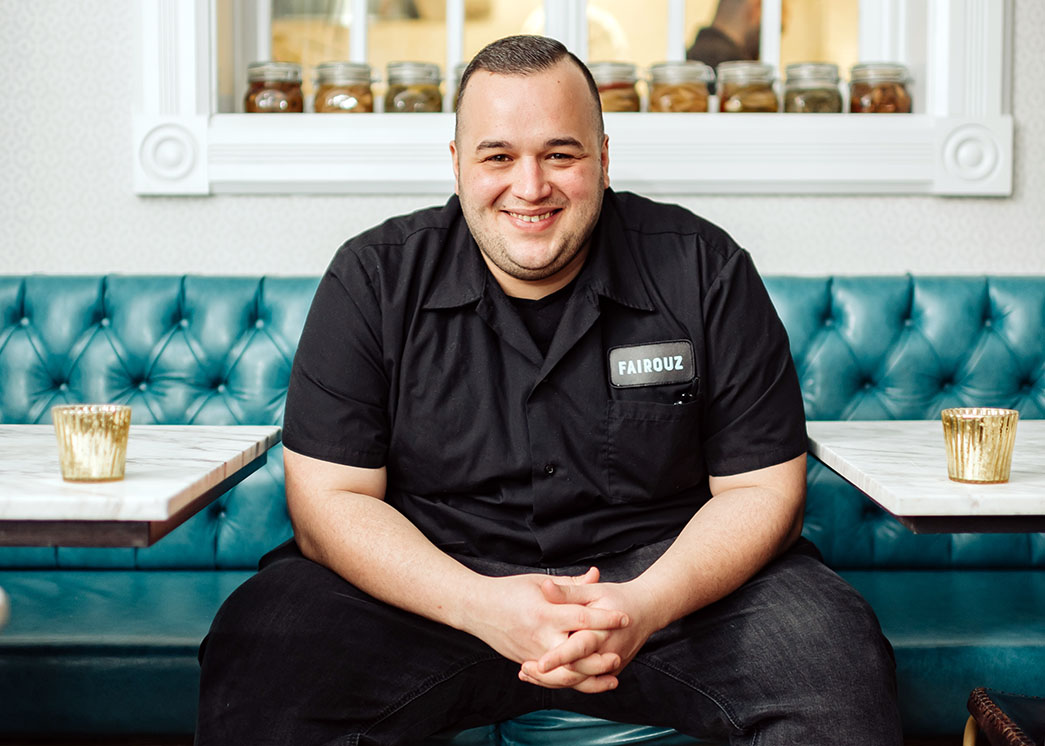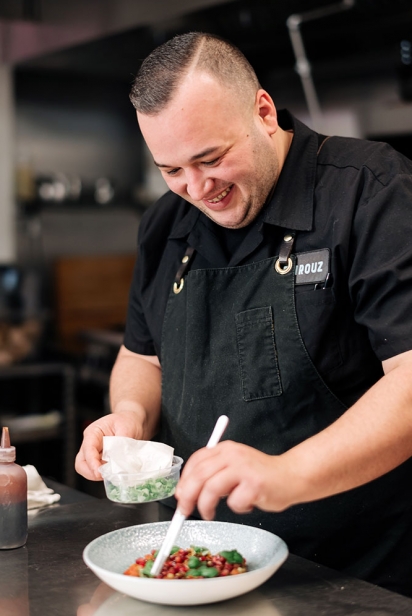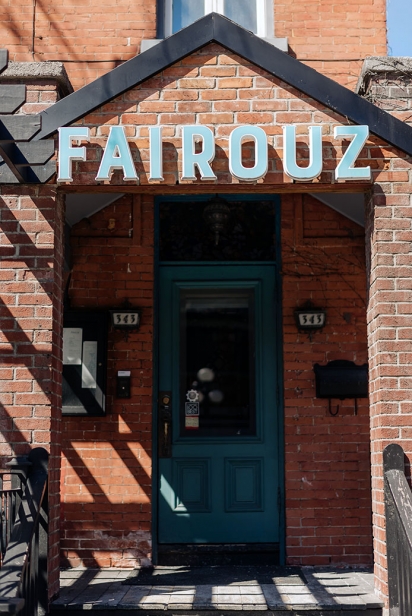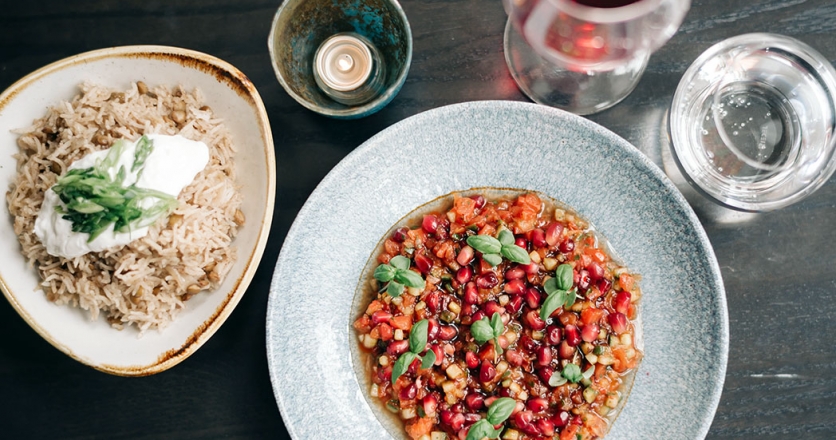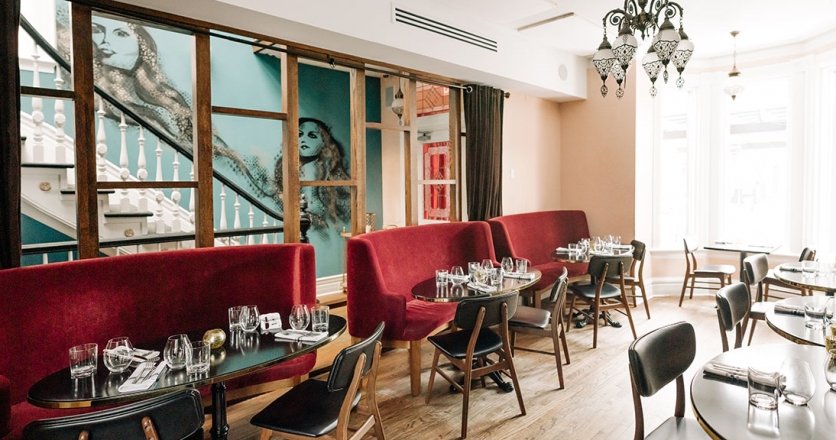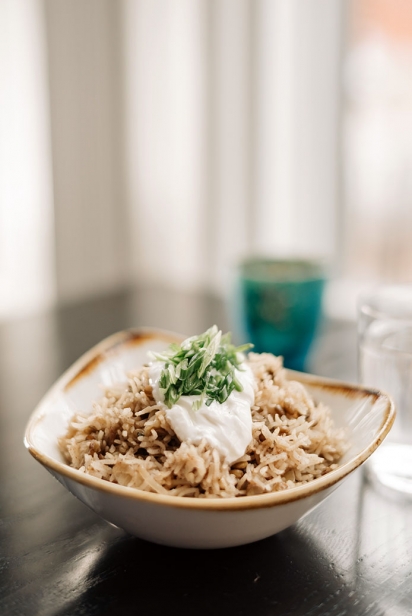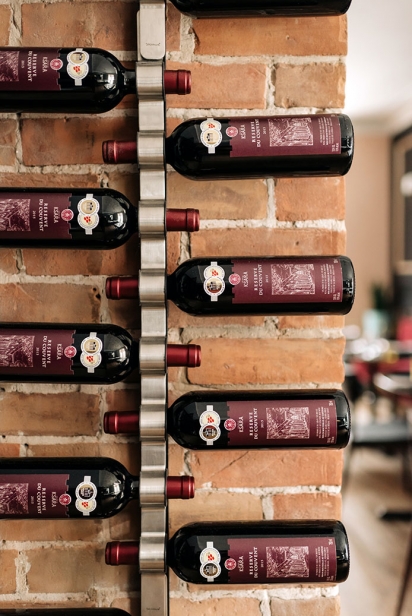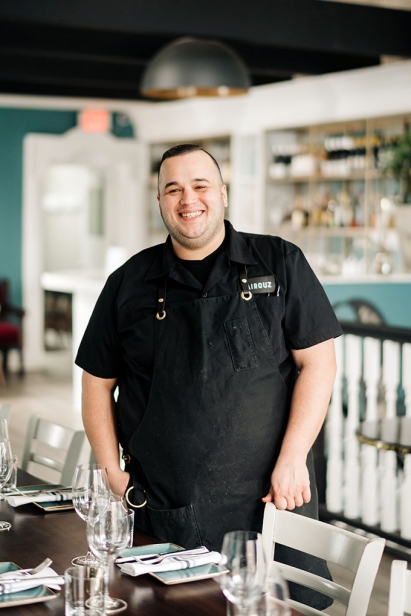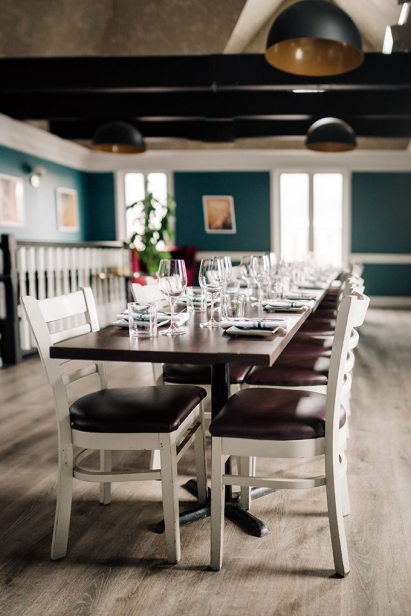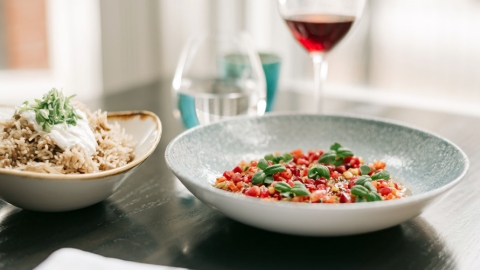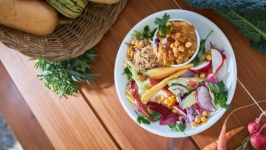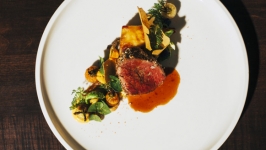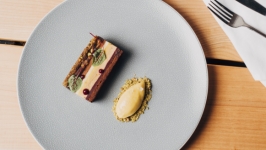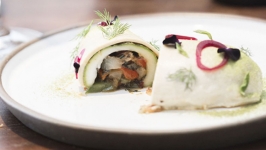The Food Needs to Have a Story
The entire Middle East leans heavily toward a vegetarian and even vegan cuisine. So says one of its native sons — Walid El-Tawel, executive chef at Fairouz restaurant.
El-Tawel wasn’t at all surprised when told that in an informal poll asking Ottawa vegetarians and vegans for their favourite fine-dining restaurants, his restaurant came up again and again.
“Our cuisine has a real vegetarian influence,” El-Tawel says. “We are, as a culture, peasants. We worked the land. If you look back in anthropology, there wasn’t a lot of protein and the protein they had was raised. The land was arid.”
One of his favourite dinners as a kid was mujaddara — a cinnamon and lentil rice dish with fried onions and yogurt on top. It’s what he thought of when edible Ottawa asked him for a recipe that spoke to his heritage and his culinary philosophy. His family served it with a simple salad and that was dinner, he says.
“At that point, we had money for protein, but this was our cultural cuisine.”
The dishes sound simple, and they are, but the flavours are complex. The dish has five ingredients, including salt, but the mingling of flavours in the basmati rice and the cinnamon make it seem as though there are a dozen spices in it. Meanwhile, the spoon salad, which is so described because you should get a little bit of every ingredient in each bite, is also more complex in taste than the ingredients would suggest. Cukes, tomatoes and red onion are minced to the size of the pomegranate seeds and the spices, paste and peppers conspire with the lemon juice and pomegranate molasses to give it bite. The result is a symphony of flavours.
The early days
These recipes bring the chef back to Abu Dhabi, the capital of the United Arab Emirates, where he was born and lived until he moved to Ottawa 17 years ago, at the age of 15. His father is Palestinian and his mom is “tea-and-crumpets” British. They met in London, where his dad was studying geophysics. After his studies, the couple moved to Abu Dhabi where his dad’s PhD in inorganic chemistry secured him a job in petroleum engineering. Those were heady days in the UAE, which secured independence in 1971 and has some of the largest oil reserves in the world. Most of his extended family relocated to Abu Dhabi, including his paternal grandmother, who would host large family gatherings every Friday.
“Family for me has always been about food,” says El-Tawel, a self-confessed family man. “And food for us means a gathering. After Friday prayers, we’d all congregate at grandma’s. My whole family was there — dinner would be 50 to 60 people. But everyone pulled their weight. My dad is a phenomenal cook. He makes some of the best leg of lamb I’ve ever had. And my mom, because she was exposed to the culture, cooks insane Middle Eastern food.”
He remembers when the family moved to Canada, his mom cooked a rice pilau with peas, almonds, ground lamb and rice, for his school’s world fair.
“So you have this five-foot-two British lady — with full accent and everything — making a Middle Eastern dish,” he laughs.
Returning to his routes
El-Tawel has had a remarkable career given he’s only 32 years old, but his latest culinary conquest — at the helm of Fairouz — means the most to him, after many accolades and much soul-searching.
“I felt as though cooking here was my service to my community, after seeing how [Ottawa’s] current Middle Eastern offerings are a disservice to the cuisine,” he says, referring to the preponderance of shawarma and kabob houses.
When he left Ottawa for three-and-a-half years to work in Toronto, one of his jobs was as the chef at the restaurant in the Agha Khan Museum.
“I had exposure to 15th- and 16th-century Middle Eastern cookbooks,” he says. “I looked back at trade routes and how they influenced cuisine. That inspired me to think about my own culture. I’ve always cooked French, molecular, but as you grow older and you get over the romance of the modern-science-sexy, you ask what you’re going to be known for — ‘what is my legacy?’”
That’s when he concluded he wanted to cook Middle Eastern food professionally.
“I fell in love with it all over again,” he says, “I wanted to see how I could do what was on grandma’s table for the modern world.”
That’s how he came up with the concept for Fairouz, which he describes as a “modern journey through the Middle East.” Everything Fairouz does conforms with tradition, but always using modern methods. “We use a lot of science and we filled the kitchen with chefs, not cooks. They’re all on the same trajectory as I am.”
The restaurant aims to redefine Canadians’ view of Middle Eastern cuisine. The spring menu features the restaurant’s now-famous muhammara dip, which is made with cashews and pomegranates and served with fresh, warm homemade pitas. If he took that off the rotating menu, there would be riots. Also featured this spring are a raw raki-scented tuna with argan oil and anchovy-laced kataifi that serves as the crunch. The dish includes lemon-pepper pearls that mimic fish eggs. Other new dishes use stuffed artichoke, with rosewater harissa and stuffing ingredients that change according to the chef’s whims; eggplant mahshi, stuffed with freekeh and served with cucumber-yogurt sauce and pomegranate and pickled onion salad; dried lime and herbed rabbit, done in a mountain tea brine with couscous and chermoula (a relish-like sauce). A za'atarcrusted lamb sirloin comes with artichoke purée, aged beets and an olive and walnut dip.
Clearly, elevated Middle Eastern food is a big part of it, but there’s also the hospitality, which is thoroughly modern, complete with Sarah Little, a wine director who knows her way around Middle Eastern wines (Lebanon is making some great ones). Servers have to write exams to work in the dining room. They spend three shifts going through the menu with the chef, learning about the history of the food. Then, they spend an entire day in the kitchen with the chef, after which they write the exam. So far, only one person has failed.
In the kitchen, the sous-chef is Turkish and takes over on Sunday nights for “Mezze” — a specialty small bites menu in a more relaxed atmosphere. Another cook is Iranian.
“You see many similarities in those cuisines,” El-Tawel says. “They’re different, but you can see where things came from. It makes us go deeper into the migratory patterns, looking into how one spice got to another part of the Middle East. And it makes us proud. We’re pushing our culture forward.”
A complex culinary path
El-Tawel fell into cooking almost accidentally. After his parents moved them to Canada, wanting better opportunities for their children, a high school teacher asked him what kind of coop placement he’d like. From a catalogue full of the available opportunities, what jumped out at him was a photo of chef Russell Weir, who is now an instructor at Algonquin College but who, at the time, the executive chef at the Sheraton Ottawa Hotel.
“My teacher set up [the placement], and I was horrible,” El- Tawel says. “I put Hollandaise in a waffle-maker. I was horribly intimidated. I felt like I was subpar and knew I wasn’t fitting in.”
But sous-chef Guy Bedard took an interest in the him and tutored him each afternoon.
He soon started at the Château Laurier because he knew it would be good experience, but he learned he didn’t want the hotel kitchen life. By then, though, he knew he wanted to cook for a living and enrolled at Algonquin, with the encouragement of his mom and reluctance from his dad. In the UAE, cooking is tantamount to slave labour and the academic didn’t want that for his son.
“There was trepidation. None of my family had done it. There was no barometer, no real north. Because of that, I forced myself to be amazing at everything I did. I told myself to stay humble and push always — to keep creating, keep being better.”
After graduating, he started out inauspiciously — as a cook at the Outback Steakhouse. Then it was on to The Diner (now the Wellington Diner) and Stella Osteria, which he left after only eight months. He'd seen lots of drugs and alcohol in the industry and he wasn’t interested in that lifestyle. Instead of going out drinking after a shift, he would go home and study, to figure out where he’d gone wrong in the kitchen that night.
At this point, his resolve was wavering, but he decided to push toward his dream — to work at Restaurant e18hteen. At the time, Matt Carmichael was at the helm; Mike Radford, now the executive chef at Whalesbone, was there and John Korecki, now the executive chef at the residence of Canada’s ambassador to Japan, was the sous-chef. El-Tawel got a job as a cook and quickly rose through the ranks.
“Mike Radford became my mentor,” he says. “My favourite shift of the week was Sunday because I got to work with Mike. He used to empower me.”
Korecki eventually left to open Sidedoor and Radford went to Savannah Café. El-Tawel took over as the junior sous-chef, then sous-chef and after Carmichael left, he became the executive chef.
“I didn’t want to be,” he says. “I was petrified. I was 24 years old. I didn’t think I could do it.”
He says he excelled because of his team. Matthew Orawski was the sommelier and someone El-Tawel had known since his Outback days. Orawski was working at Manhattan’s Babbo, but left following sexual harassment allegations lodged against chef and owner Mario Batali. Ben Ing, now the head chef at Noma, the storied Copenhagen restaurant often cited as the best in the world, was one of his cooks. Steve Darou was a cook and is now the chef at one of the Michelin-starred St. John restaurants in London. Chris Vallieres, another cook, now runs the Bears Den in Cancun.
“I was their chef and I was the same age as some, but younger than most,” he says. “We worked our asses off every day. Seven days a week. We all imagined the same goal — perfection.”
He likens that unique team — each member on the cusp of breaking out — to working with Real Madrid, regarded by some as the world’s best soccer team.
“The chemistry was electric. You’d be there from 10 a.m. to 1 a.m. and be fine with it.”
At Fairouz, he feels he’s building a similar team, which he describes as multi-faith, multi-ethnic — a classic Canadian kitchen.
“We have Indian, Mexican, Canadian, Nordic, Iranian, Turkish and Palestinian,” he says of his chefs.
But it’s a steep educational curve for new chefs at Fairouz. Restaurant e18hteen wasn’t easy, but it was familiar territory for educated chefs — they knew what crab is, they knew how to make a Béarnaise sauce. At Fairouz, however, they must learn the differences between eight different za’atars, a combination of dried herbs and sesame seeds.
Once a month, he holds a costing seminar for his chefs.
“I need to add value for them,” he says. “Working at one of the best restaurants in the country is great. But how do we add value to their experience? None of them knows how to cost, so we have cost and investment classes. I don’t want them to leave, but they will eventually and when they do, I want them to leave with a full mind and a full stomach, knowing they got the most they could.”
The Toronto years
After e18hteen received a Four-Diamond designation under his leadership, head-hunting firms started calling — especially from Toronto. Eventually he gave in. He opened up Montecito, which is co-owned by Ghostbusters director Ivan Reitman. The 300- seat, $10-million restaurant was a good experience, but he didn’t share the owners’ food philosophy so he left after nine months. “The food has to speak to me,” he says.
After that, he was head-hunted to open Diwan, the restaurant at the Aga Khan Museum. That’s what got him thinking about Middle Eastern cuisine. Patrick Riley was the executive chef of the museum and is himself half European and half Middle Eastern.
“We were the same person, 30 years apart,” El-Tawel says. “We’re still in touch almost every week.”
After the museum, he moved on to Mamakas Taverna, a Greek restaurant on Ossington. By coincidence, that’s where he met his current sous-chef, Aydin Canatar. The other coincidence is that he was in Ottawa on vacation in January 2016 when headhunter Leslie Ng called and told him that his dream restaurant was opening and the owners wanted him to be chef.
“I didn’t believe him,” he recalls. “I’d only packed T-shirts and sweatpants so I couldn’t really do an interview. Leslie told me he didn’t care if I showed up naked.”
El-Tawel knew co-owner Hussain Rafal because he’d been a customer when El-Tawel was at e18hteen.
“I wore sweatpants and a T-shirt to the interview,” he says. “My brother dropped me off and I told him to wait because I figured we’d be about 15 minutes. We were five-and-a-half hours. We talked about everything.”
A simple culinary philosophy
His influences are all the people he’s worked with in the past. “They’ve spurred me to push myself. They’ve all been integral parts. I’m grateful. I still see cooking as a learning experience.”
His parents and siblings are also influences, with his mom being “the rock of my life.” Even his dad has come around to the idea of his son being a chef.
“They’re amazing and so supportive,” he says with a smile, looking around the restaurant he’s helped build.
The “family man” is single — “I’m dating a woman named Fairouz,” he says with a laugh, noting that his profession makes it hard to meet a mate.
His philosophy at Fairouz is straight-forward. The food that feeds his soul is always “from scratch” and it must pay respect to the past, while emerging in a modern light.
“There’s a place for kabob and shawarma, but Middle Eastern food is being so misrepresented. We need to redefine the world’s expectations of what it is.”
Before starting at Fairouz, he spent three months locked inside his Toronto home reading about the Middle East — its traditions, history, philosophy and food.
“I read a lot of philosophy and stoicism, to make sure I’m always being a better leader. I’d rather read anthropology about the Middle East, about where the spices came from, than cookbooks. For me, the food has to have a story. I can’t create without a story. The food is in my soul."
Fairouz
343 Somerset St., W., Ottawa, Ont.
fairouz.ca | 613.422.7700 | @fairouzottawa


